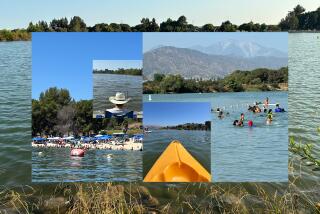Liability Coverage Grows Scarce : Water Slide Park, Hot Tub Facility Struggle to Find Insurance
‘Theme parks, amusement parks and recreational facilities with anything beyond a baseball diamond are being deserted by insurance companies across the country.’
--Hank Bachrach,
Risk management expert
The Raging Waters amusement park in San Dimas and the just-completed Puddingstone hot tub facility nearby face an uphill battle finding liability insurance before they will be allowed to open for business this spring, Los Angeles County officials said.
Raging Waters, whose liability insurance expires in May, has not secured the $1 million in insurance needed to continue operating.
Officials of Bryant Morris Development, which operates the water slide at Frank G. Bonelli Regional Park, said they are awaiting word from 30 insurance companies they have approached and are optimistic that coverage can be arranged.
At the same time, Puddingstone Hottubs, a new hourly rental hot-tub facility overlooking Puddingstone Reservoir at the regional park, has secured only $1 million of the $3 million in liability insurance required by its Los Angeles County contract.
Potential Victims
The privately leased facilities, both on county property, and several other concessions at parks around the county are potential victims of a trend in which insurance companies are refusing to provide liability coverage, county officials say.
“Theme parks, amusement parks and recreational facilities with anything beyond a baseball diamond are being deserted by insurance companies across the country,” said Hank Bachrach, chief of the Los Angeles County’s risk management division.
“We’re seeing it across the board,” said Bill Harvey, contracts director for the county’s Department of Parks and Recreation. “In the next six months we have 20 insurance contracts (held by concessionaires) that are going to expire and need to be renewed. We’re going to do our best to help them out of this problem on a case-by-case basis.”
Kent Lemasters, vice president and general manager of Bryant Morris Development, said his company has begun an aggressive campaign to persuade insurance companies that Raging Waters is a good risk. The firm sent out 30 pamphlets explaining Raging Waters’ facilities and training and safety programs and is expecting “some hot prospects,” he said.
‘Alternate Plans’
However, Lemasters said, “If it doesn’t work, we are working with Parks and Recreation on alternate plans so we can open in May.”
Bachrach said Los Angeles county is exploring several solutions for Raging Waters and other concessionaires facing trouble. They include reducing the insurance required by the county, asking the concessionaire to start a cash fund for future settlements, or allowing concessionaires to insure for “calamities,” without having to insure for smaller incidents.
Although several county officials have blamed the current insurance crunch on the “deep-pockets” liability provision in state law, Bachrach said the insurance crisis was brought on by several other factors as well.
Among them, he said, are a downward trend in interest rates, an increasing push by attorneys to win larger settlements and the pull-out by several European insurance companies who no longer operate in the North American market.
Under the deep-pockets provision, injured persons are granted financial settlements paid by the wealthiest defendants, even if the wealthiest defendants were only minimally at fault. In such cases the wealthiest defendant can be required to pay a disproportionate share of his liability. Such payments are sought when the defendant most at fault has no assets. For example, county officials said, a passenger injured by a drunk driver who happened to run into a county road sign could get the lion’s share of his settlement from county coffers--as long as the jury determined that the county sign had in some way contributed to the accident, and the drunk driver had no assets.
John McCann, regional vice president of the Insurance Information Institute, said liability insurance for recreational facilities and parks has also dried up because municipalities have lost many immunities from lawsuits that they once had, and in recent years California courts have granted unusually large awards against government entitities.
Prospects Called Slim
At Raging Waters, where patrons zip down steep water slides and venture into eight-foot-deep water on rafts, prospects for getting liability insurance have grown slim because of the insurance crisis, county officials said.
Los Angeles County and the park’s operators have been sued in Pomona Superior Court in the drowning last July of an 8-year-old girl who had been floating on a raft in Wave Cove, a pool in which man-made waves rise and fall. The girl’s father lost sight of her and alerted lifeguards, who found her unconscious in about eight feet of water.
However, Bachrach said the companies that have begun denying amusement parks liability insurance are not investigating any current claims against the parks.
“Individual loss histories are not being evaluated,” he said. “The insurance companies are just saying no.”
Harvey said Raging Waters is a moneymaker for the county, generating between $250,000 and $350,000 in rental income each year. Last year alone, it attracted 450,000 visitors.
Plan to Meet
County officials plan to meet in the next few days to determine the best way to help the facility get insurance.
“They’ve obviously demonstrated a service that the public wants,” Harvey said. “We’re approaching it that it’s going to open one way or the other.”
Puddingstone Hottubs, which the county has promoted as the latest recreational offering at the increasingly popular park, is also ready to open. But the facility is $2 million short of the $3-million liability insurance required by its county contract, county officials said.
Lynn Swann, co-owner of the facility, said he and his family, who constructed and will operate the hot tubs, hope the county will soften its insurance requirements.
“We’re hoping to show the county that we have plenty of insurance, or we won’t be able to open,” Swann said. “We’re doing research and presenting it to them, including the amount of risk at our facility, and the lawsuits at similar facilities over the years.”
11-Tub Outdoor Spa
Swann said that when he and his family began building the 11-tub outdoor spa facility last spring, there was plenty of liability insurance available.
“But a lot has changed in the last 10 months,” Swann said. “There’s a big insurance squeeze out there. . . . We never thought we would have this kind of problem.”
Harvey said chances are good that the county will be able to lower the insurance requirements for the hot tubs.
“That’s the direction we’re heading because we’d like to see them open,” he said.
Harvey said that in addition to Raging Waters and Puddingstone Hottubs, at least six other park concessionaires around the county face difficulty in renewing their liability insurance.
Those concessionaires include the operators of the horse-rental stables at Bonelli Regional Park, the tennis courts at Lakewood Golf Course and Whittier Narrows Park, a boat rental facility at Whittier Narrows, the concessionaires who run Tapia Park in the Santa Monica mountains and operators of a hotel complex under construction at Pan Pacific Park on Beverly Boulevard in Los Angeles.
More to Read
Inside the business of entertainment
The Wide Shot brings you news, analysis and insights on everything from streaming wars to production — and what it all means for the future.
You may occasionally receive promotional content from the Los Angeles Times.










